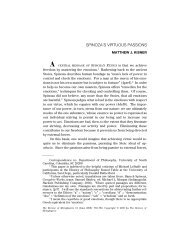heidegger's being and time and national socialism - Philosophy ...
heidegger's being and time and national socialism - Philosophy ...
heidegger's being and time and national socialism - Philosophy ...
Create successful ePaper yourself
Turn your PDF publications into a flip-book with our unique Google optimized e-Paper software.
See already Fritsche, Historical Destiny <strong>and</strong> National<br />
Socialism, 194–97.<br />
175. Heidegger, Hölderlins Hymnen “Germanien” und<br />
“Der Rhein,” 72.<br />
176. Ibid., 72.<br />
177. Ibid.<br />
178. Ibid., 72–73.<br />
179. Ibid., 73.<br />
180. Ibid., 73. Probably, only a recording of Heidegger’s<br />
voice could tell whether this sentence was only a<br />
threat against all those who were not really National<br />
Socialists or whether it also expressed skepticism regarding<br />
the chances to realize National Socialism.<br />
181. Heidegger, Being <strong>and</strong> Time, 435; Sein und Zeit, 383;<br />
see Fritsche, Historical Destiny <strong>and</strong> National Socialism,<br />
55–60; see above, n. 119.<br />
182. Heidegger, Being <strong>and</strong> Time, 436; Sein und Zeit, 384.<br />
183. Heidegger, Hölderlins Hymnen “Germanien” und<br />
“Der Rhein,” 44 <strong>and</strong> passim.<br />
184. One might object that the phrase, “If we do not compel<br />
powers into our Dasein,” indicates that Dasein<br />
does not act in obedience to a comm<strong>and</strong> of something<br />
“higher” than Dasein but spontaneously <strong>and</strong><br />
against all existing powers <strong>and</strong> entities. However, in<br />
the sentence in question not these powers but rather<br />
ordinary (or inauthentic) Dasein or society has to be<br />
forced (to accept within it the powers). Inauthentic<br />
Dasein or society is the sphere of Schein which has to<br />
be destroyed (see above, n. 128).<br />
185. Heidegger, Being <strong>and</strong> Time, 437; Sein und Zeit,<br />
385 (“sich seinen Helden wählt”). For the “German”<br />
notion of hero (who does not singularize himself but<br />
finds fulfillment in his sacrifice of himself for the<br />
German cause) see Fritsche, Historical Destiny <strong>and</strong><br />
National Socialism, 323–27n60.<br />
186. For suggestions what he could have written if he had<br />
wanted to avoid any allusion to World War I see ibid.,<br />
233n7.<br />
187. Heidegger, Hölderlins Hymnen “Germanien” und<br />
“Der Rhein,” 51 <strong>and</strong> context.<br />
188. Heidegger, “Der deutsche Student als Arbeiter: Rede<br />
bei der feierlichen Immatrikulation 25. November<br />
1933,” 208.<br />
189. Fritsche, Historical Destiny <strong>and</strong> National Socialism,<br />
122–23.<br />
190. On Scheler’s hymn on World War I, Der Genius des<br />
Krieges (The Genius of War), from 1915, a book of<br />
more than 500 pages, see ibid., 87–92.<br />
191. Heidegger, Being <strong>and</strong> Time, 160; Sein und Zeit, 123.<br />
Bog'aziçi University, Istanbul, Turkey<br />
PHILOSOPHY TODAY<br />
284
















